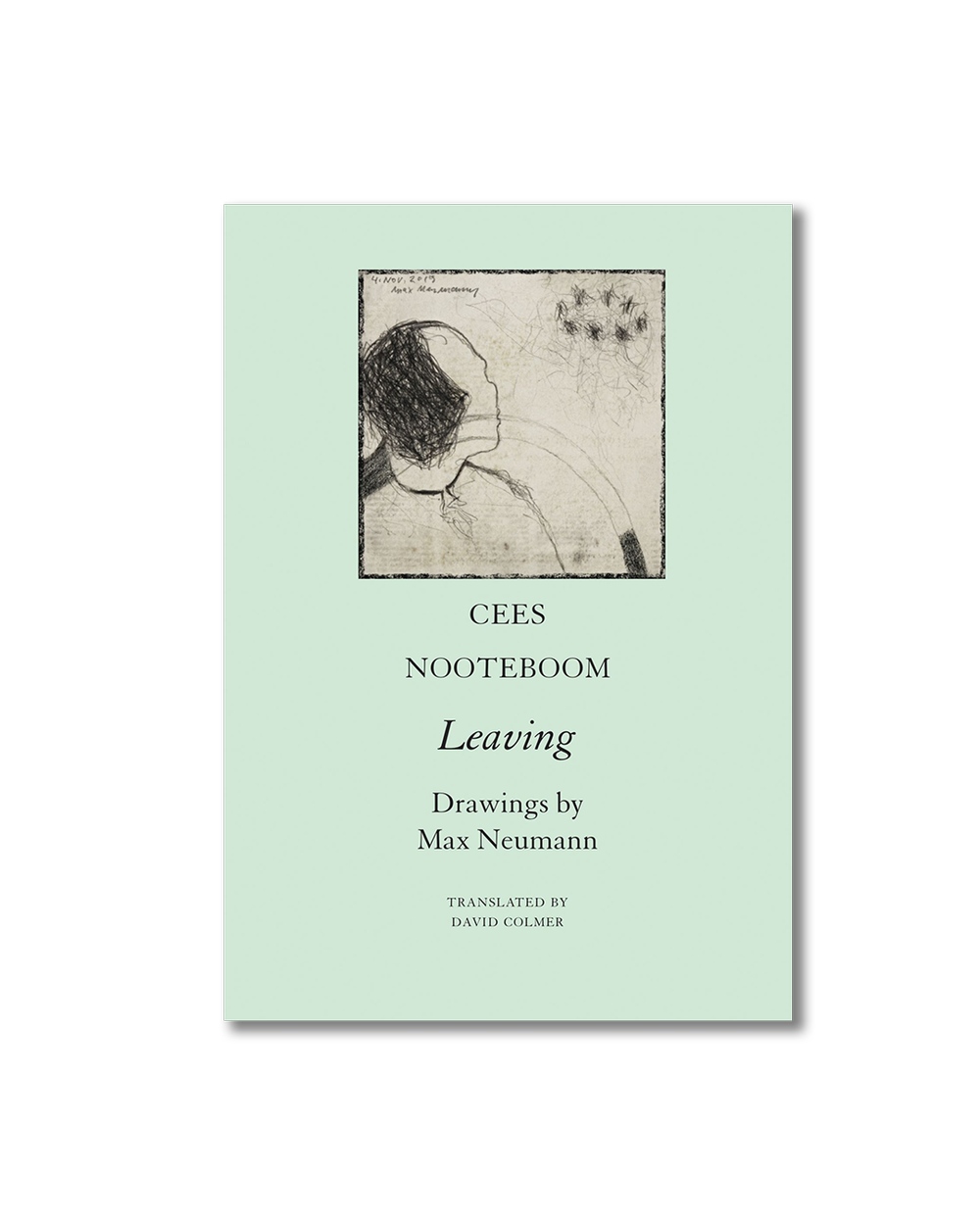"Next stop Armageddon": On Cees Nooteboom's "Leaving"
Cees Nooteboom; transl. David Colmer, with drawings by Max Neuman | Leaving: A Poem from the Time of the Virus | Seagull Books | 2021 | 92 Pages
The English edition of Leaving: A Poem from the Time of the Virus, originally published in Dutch, is a collaboration between the poet Cees Nooteboom, the translator David Colmer, and the visual artist Max Neuman. Neuman’s 33 color plates mirror the text—one for every poem—illustrating in eerie sepia what Nooteboom sees in the time of the virus: faces without features, figures reduced to anonymity, cloaked and masked. “I saw heads,” he writes, “countless heads.” These artworks, along with Colmer’s sophisticated and attentive translation, make the English edition a new and worthwhile work in its own right.
Leaving is a slim book of 33 poems, each of 13 lines. They are laconic—three four-line stanzas plus a final half-line, often just two words long—but they have an ambitious mandate: to respond, in some sense, to a global pandemic that remains ongoing. The near-sonnets often are often in conflict with themselves (“contradiction / surrounds me”) and often turn in their very last phrase. Their structure begins to give form to a subject that feels like it has none, but the poems never fully cohere, ending, instead, on ominous fragments.
Though not well known in the U.S., Nooteboom is one of the most eminent poets writing in Dutch, and at 88 has enough clout and perspective to take on the the seemingly ungovernable moment of the pandemic. Foregoing the banalities of quarantine writing that quickly became clichés, Nooteboom waited, then provided a vision of the pandemic that is contiguous with the future and the past—his past—rather than a freakish aberration. Often this means conjuring images of the Second World War, which he experienced in the Netherlands as a boy: “He’s seen that in the war, defeated soldiers / in retreat, frightened, dirty, the mouths / that sang so heartily when they marched in / now closed.” For Nooteboom, the present is defined by “The war that never stopped coming back,” as he puts it.
One of the most sobering pandemic revelations for many has been recognizing that Covid will not just end, it will become endemic, permanently altering not only the physical human biome, but the way we relate to one another socially and culturally. Nooteboom apprehends the sense that Covid is one potent symptom of an era of dangerous anonymity—we live at the mercy of fellow citizens who grow more distant by the day. What was supposed to be a future of clarity (the word “clear” comes up often in the book)—in which a shared memory of desolation binds people towards peace and cooperation—turns out to be a new kind of murkiness. The War didn’t end modernity, it started it.
Nooteboom’s preoccupation with deep evolutionary history, too, and the understanding of individuals as genetic creatures reinforces a longer view of time than we may be accustomed to taking in the Covid era. This language can be difficult to render in English, but Colmer does so masterfully, often while retaining complex rhythms in the Dutch. He translates: “An evolutionary backstreet, hair / sprouting from throats,” carrying across the casual diction and springy prosody of the original.
As Nooteboom approaches 90, his poems feel immediate and urgent, yet also unhooked from time. The rather chintzy title can be justified, because the text of the collection doesn’t mention the virus at all. Instead, the loneliness embodied by his faceless faces seem just as well to grieve an era of Internet-induced isolation as it does the Dutch Hunger Winter of 1945. “eyes strayed / up and down in want of foreheads, solitary / limbs wandered, apparitions, a phantasmagoria / woven from evil stories, but please // take a seat.” We are his audience, albeit a slightly unwilling one, and the occasional moment of wryness acknowledges our discomfort. The images that surface over and over are faces, limbs, bodies, often in grotesque contortions, such as a snake who turns human. Sometimes the horror can be almost too much to bear, but Nooteboom is there to interrogate our dissatisfaction: “You wanted to live, didn’t you? / Did you only want gold, the blue / of the sky, love, the sun?” As a reader, I’m tempted to respond with a Yes, but Nooteboom’s authorial credibility, bolstered by first-hand depictions of war, lends a dose of perspective. Later, he cautions against denialism: “Don’t walk away. Stay with this gentle / view of a summer’s evening.”
Amid Nooteboom’s masks, shadows, and mirrors, no one is clearly visible, least of all the self. Time passes only with meticulous counting. He writes often of “bestemming,” which Colmer has rightly chosen to translate as “destination,” though the word contains echoes of “purpose” and even “voice.” In this way, Nooteboom grapples with the end of his own career, and the apocalyptic Zeitgeist. “Next stop Armageddon,” he writes, “a continent / where time does not apply.” The book is unmistakably a meditation on old age. Beyond “leaving,” the Dutch title, Afscheid, also means “farewell,” and this collection is without doubt a valediction from late in life, rife with allusions to the world beyond. Fretting about a future of oblivion also happens to rhyme nicely with how many readers are feeling in this political moment.
After reading this book, I have come to understand Nooteboom’s obsession with deep history partially as a naïve, escapist fantasy. “We have left the others / behind in the bliss / of innocence, brothers / and sisters who do not know // their end”—how nice to be an early mammal, unencumbered by knowledge of death. But then: animals miss out on the pleasure of language. The poem ends, “tails and shells // but no names.”

